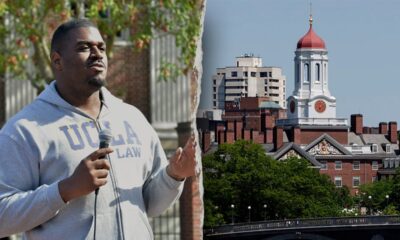Politics
Fetterman: Those hoping Trump fails are 'rooting against the nation'

Sen. John Fetterman, D-Pa., says he hopes President-elect Trump is successful, and spoke out against those who feel otherwise.
Fetterman appeared Sunday on ABC’S “This Week.” His more than 10-minute sit-down segment was pre-recorded with co-anchor Jonathan Karl.
“I’m not rooting against him,” the Democratic senator said. “If you’re rooting against the president, you are rooting against the nation. And and I’m not ever going to be where I want a president to fail. So, country first. I know that’s become maybe like a cliche, but it happens to be true.”
The senator told Karl he never believed Trump’s movement was about fascism, while noting that it was Vice President Kamala Harris’ “prerogative” to call Trump a fascist during her campaign.
FETTERMAN MEETS WITH TRUMP NOMINEES, PLEDGES ‘OPEN-MIND AND AN INFORMED OPINION’ FOR CONFIRMATION VOTES
Sen. John Fetterman talks with West Point cadets in the Senate subway on Nov. 19, 2024. (Tom Williams/CQ-Roll Call, Inc via Getty Images)
“Fascism, that’s not a word that regular people use, you know?” Fetterman said. “I think people are going to decide who is the candidate that’s going to protect and project, you know, my version of the American way of life, and that’s what happened.”
Fetterman has been meeting with Trump’s Cabinet nominees, noting that his decision about whether to vote to confirm the candidates will stem from an open mind and informed perspective.
FETTERMAN SAYS DEMS SHOULDN’T ‘FREAK OUT’ OVER EVERYTHING TRUMP DOES: ‘IT’S GOING TO BE 4 YEARS’
Sen. John Fetterman and Rep. Elise Stefanik, who has been nominated to be the U.S. ambassador to the United Nations in the Trump administration. (@EliseStefanik on X)
“I believe that it’s appropriate and the responsibility of a U.S. senator to have a conversation with President-elect Trump’s nominees. That’s why I met with Elise Stefanik and Pete Hegseth, just wrapped with Tulsi Gabbard, and look forward to my meetings with others soon,” Fetterman declared in a post on X.
“My votes will come from an open mind and an informed opinion after having a conversation with them. That’s not controversial, it’s my job,” he continued.
Sen. John Fetterman gestures while speaking at a rally for Democratic vice presidential nominee Minnesota Gov. Tim Walz on Oct. 2, 2024, in York, Pennsylvania. (Andrew Harnik/Getty Images)
More than a month ago, Fetterman said Democrats cannot afford to “freak out” over everything Trump says or does. He echoed that sentiment on Sunday, again mentioning that Trump has not even taken office yet.
Fox News’ Alex Nitzberg contributed to this report.

Politics
Video: Trump Says ‘Only Time Will Tell’ How Long U.S. Controls Venezuela

new video loaded: Trump Says ‘Only Time Will Tell’ How Long U.S. Controls Venezuela
transcript
transcript
Trump Says ‘Only Time Will Tell’ How Long U.S. Controls Venezuela
President Trump did not say exactly how long the the United states would control Venezuela, but said that it could last years.
-
“How Long do you think you’ll be running Venezuela?” “Only time will tell. Like three months. six months, a year, longer?” “I would say much longer than that.” “Much longer, and, and —” “We have to rebuild. You have to rebuild the country, and we will rebuild it in a very profitable way. We’re going to be using oil, and we’re going to be taking oil. We’re getting oil prices down, and we’re going to be giving money to Venezuela, which they desperately need. I would love to go, yeah. I think at some point, it will be safe.” “What would trigger a decision to send ground troops into Venezuela?” “I wouldn’t want to tell you that because I can’t, I can’t give up information like that to a reporter. As good as you may be, I just can’t talk about that.” “Would you do it if you couldn’t get at the oil? Would you do it —” “If they’re treating us with great respect. As you know, we’re getting along very well with the administration that is there right now.” “Have you spoken to Delcy Rodríguez?” “I don’t want to comment on that, but Marco speaks to her all the time.”
January 8, 2026
Politics
Trump calls for $1.5T defense budget to build ‘dream military’

NEWYou can now listen to Fox News articles!
President Donald Trump called for defense spending to be raised to $1.5 trillion, a 50% increase over this year’s budget.
“After long and difficult negotiations with Senators, Congressmen, Secretaries, and other Political Representatives, I have determined that, for the Good of our Country, especially in these very troubled and dangerous times, our Military Budget for the year 2027 should not be $1 Trillion Dollars, but rather $1.5 Trillion Dollars,” Trump wrote on Truth Social on Thursday evening.
“This will allow us to build the “Dream Military” that we have long been entitled to and, more importantly, that will keep us SAFE and SECURE, regardless of foe.”
The president said he came up with the number after tariff revenues created a surplus of cash. He claimed the levies were bringing in enough money to pay for both a major boost to the defense budget “easily,” pay down the national debt, which is over $38 trillion, and offer “a substantial dividend to moderate income patriots.”
SENATE SENDS $901B DEFENSE BILL TO TRUMP AFTER CLASHES OVER BOAT STRIKE, DC AIRSPACE
President Donald Trump called for defense spending to be raised to $1.5 trillion, a 50% increase over this year’s record budget. (AP Photo/Evan Vucci)
The boost likely reflects efforts to fund Trump’s ambitious military plans, from the Golden Dome homeland missile defense shield to a new ‘Trump class’ of battleships.
The Committee for a Responsible Federal Budget found that the increased budget would cost about $5 trillion from 2027 to 2035, or $5.7 trillion with interest. Tariff revenues, the group found, would cover about half the cost – $2.5 trillion or $3 trillion with interest.
The Supreme Court is expected to rule in a major case Friday that will determine the legality of Trump’s sweeping tariff strategy.
CONGRESS UNVEILS $900B DEFENSE BILL TARGETING CHINA WITH TECH BANS, INVESTMENT CRACKDOWN, US TROOP PAY RAISE
This year the defense budget is expected to breach $1 trillion for the first time thanks to a $150 billion reconciliation bill Congress passed to boost the expected $900 billion defense spending legislation for fiscal year 2026. Congress has yet to pass a full-year defense budget for 2026.
Some Republicans have long called for a major increase to defense spending to bring the topline total to 5% of GDP, as the $1.5 trillion budget would do, up from the current 3.5%.
The boost likely reflects efforts to fund Trump’s ambitious military plans, from the Golden Dome homeland missile defense shield to a new ‘Trump class’ of battleships. (Lockheed Martin via Reuters)
Trump has ramped up pressure on Europe to increase its national security spending to 5% of GDP – 3.5% on core military requirements and 1.5% on defense-related areas like cybersecurity and critical infrastructure.
Trump’s budget announcement came hours after defense stocks took a dip when he condemned the performance rates of major defense contractors. In a separate Truth Social post he announced he would not allow defense firms to buy back their own stocks, offer large salaries to executives or issue dividends to shareholders.
“Executive Pay Packages in the Defense Industry are exorbitant and unjustifiable given how slowly these Companies are delivering vital Equipment to our Military, and our Allies,” he said.
“Defense Companies are not producing our Great Military Equipment rapidly enough and, once produced, not maintaining it properly or quickly.”
U.S. Army soldiers stand near an armored military vehicle on the outskirts of Rumaylan in Syria’s northeastern Hasakeh province, bordering Turkey, on March 27, 2023. (Delil Souleiman/AFP via Getty Images)
He said that executives would not be allowed to make above $5 million until they build new production plants.
CLICK HERE TO DOWNLOAD THE FOX NEWS APP
Stock buybacks, dividends and executive compensation are generally governed by securities law, state corporate law and private contracts, and cannot be broadly restricted without congressional action.
An executive order the White House released Wednesday frames the restrictions as conditions on future defense contracts, rather than a blanket prohibition. The order directs the secretary of war to ensure that new contracts include provisions barring stock buybacks and corporate distributions during periods of underperformance, non-compliance or inadequate production, as determined by the Pentagon.
Politics
Newsom moves to reshape who runs California’s schools under budget plan

SACRAMENTO — Gov. Gavin Newsom on Thursday unveiled a sweeping proposal to overhaul how California’s education system is governed, calling for structural changes that he said would shift oversight of the Department of Education and redefine the role of the state’s elected schools chief.
The proposal, which is part of Newsom’s state budget plan that will be released Friday, would unify the policymaking State Board of Education with the department, which is responsible for carrying out those policies. The governor said the change would better align education efforts from early childhood through college.
“California can no longer postpone reforms that have been recommended regularly for a century,” Newsom said in a statement. “These critical reforms will bring greater accountability, clarity, and coherence to how we serve our students and schools.”
Few details were provided about how the role of the state superintendent of public instruction would change, beyond a greater focus on fostering coordination and aligning education policy.
The changes would require approval from state lawmakers, who will be in the state Capitol on Thursday for Newsom’s last State of the State speech in his final year as governor.
The proposal would implement recommendations from a 2002 report by the state Legislature, titled “California’s Master Plan for Education,” which described the state’s K-12 governance as fragmented and “with overlapping roles that sometimes operate in conflict with one another, to the detriment of the educational services offered to students.” Newsom’s office said similar concerns have been raised repeatedly since 1920 and were echoed again in a December 2025 report by research center Policy Analysis for California Education.
“The sobering reality of California’s education system is that too few schools can now provide the conditions in which the State can fairly ask students to learn to the highest standards, let alone prepare themselves to meet their future learning needs,” the Legislature’s 2002 report stated. Those most harmed are often low-income students and students of color, the report added.
“California’s education governance system is complex and too often creates challenges for school leaders,” Edgar Zazueta, executive director of the Assn. of California School Administrators, said in a statement provided by Newsom’s office. “As responsibilities and demands on schools continue to increase, educators need governance systems that are designed to better support positive student outcomes.”
The current budget allocated $137.6 billion for education from transitional kindergarten through the 12th grade — the highest per-pupil funding level in state history — and Newsom’s office said his proposal is intended to ensure those investments translate into more consistent support and improved outcomes statewide.
“For decades the fragmented and inefficient structure overseeing our public education system has hindered our students’ ability to succeed and thrive,” Ted Lempert, president of advocacy group Children Now, said in a statement provided by the governor’s office. “Major reform is essential, and we’re thrilled that the Governor is tackling this issue to improve our kids’ education.”
-

 Detroit, MI5 days ago
Detroit, MI5 days ago2 hospitalized after shooting on Lodge Freeway in Detroit
-

 Technology2 days ago
Technology2 days agoPower bank feature creep is out of control
-

 Dallas, TX4 days ago
Dallas, TX4 days agoDefensive coordinator candidates who could improve Cowboys’ brutal secondary in 2026
-

 Health5 days ago
Health5 days agoViral New Year reset routine is helping people adopt healthier habits
-

 Nebraska2 days ago
Nebraska2 days agoOregon State LB transfer Dexter Foster commits to Nebraska
-

 Iowa2 days ago
Iowa2 days agoPat McAfee praises Audi Crooks, plays hype song for Iowa State star
-

 Nebraska2 days ago
Nebraska2 days agoNebraska-based pizza chain Godfather’s Pizza is set to open a new location in Queen Creek
-

 Entertainment2 days ago
Entertainment2 days agoSpotify digs in on podcasts with new Hollywood studios
















